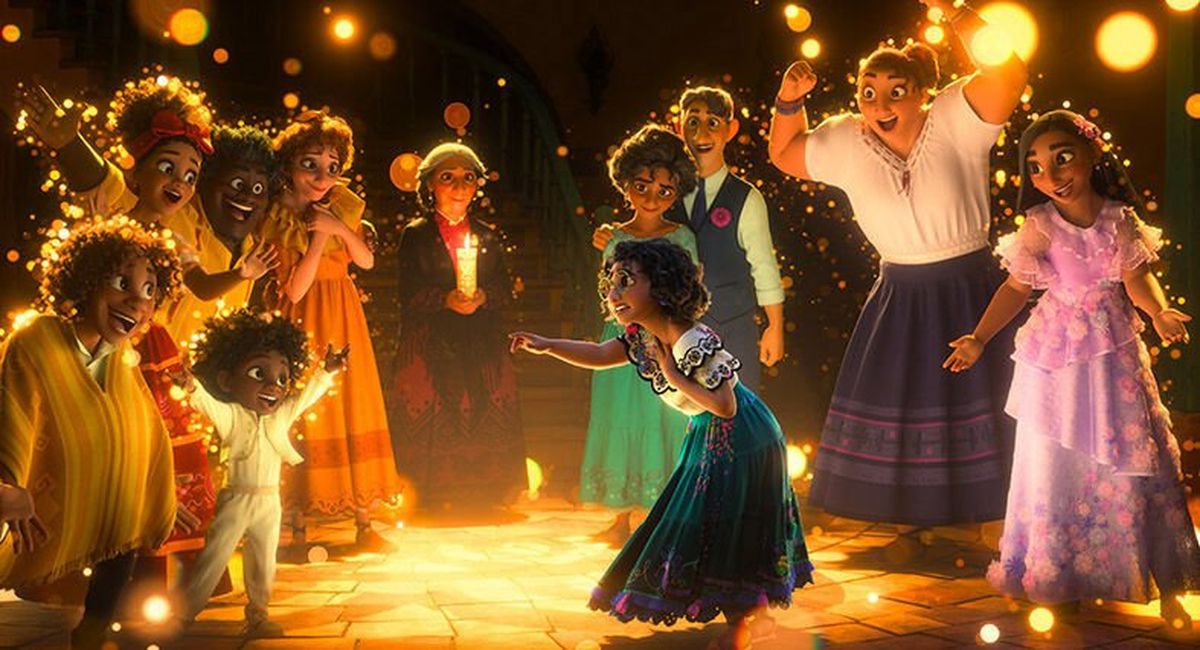Review: Disney’s ‘Encanto’ has a simple but powerful message: It’s not what you do but who you are that counts

Mirabel Madrigal has a problem – or maybe she is the problem. The 15-year-old heroine of “Encanto,” Disney’s latest shoo-in for an animated-feature Oscar nomination, belongs to a very special family. Years ago, when her grandmother (voice of María Cecilia Botero) was forced to flee her home with infant triplets, she was “granted a miracle,” though by whom and why is never explained.
First part of that miracle? A magical house, high in the mountains of Colombia, that is almost a living organism. Second: Every member of the Madrigal family – not including in-laws – is given a special ability as a child. Mirabel’s mother (Angie Cepeda) can heal injury and sickness with her cooking. Aunt Pepa (Carolina Gaitan) controls the weather via her emotions. One sister has super-strength, while another is effortlessly graceful, gorgeous and can summon flowers from thin air.
But Mirabel (Stephanie Beatriz) has no gift. Her grandmother reminds her of this often. When the house’s foundations start to crack, and her relatives’ gifts begin dimming and disappearing, Mirabel decides to track down the problem. What follows is delightfully complicated; it’s a quest in which our heroine never leaves home, and the enemy – if there is one – isn’t who you’d expect.
Even if the story lacks logic at some points, when you keep in mind that the whole saga started with an unexplained miracle, it’s easy enough to forgive the lack of cohesion. The characters deepen marvelously as the story goes on, and it becomes clearer that the blessings received as children have now become burdens. If you can manipulate the weather, for example, there’s a lot of pressure to keep things sunny.
And the film’s overarching message, while one we’ve heard before – people are worthy of love because of who they are, not what they do – is simple yet powerful. The visuals are lush and lovely, down to such tiny details as the reflections in Mirabel’s glasses. (In an important step for representation, she’s the first bespectacled Disney “princess.”) Her adorably rumpled curls beg the questions: What product does she use to keep then from going frizzy in the Colombian humidity?
Directors Jared Bush, Byron Howard and Charise Castro Smith rely heavily on close-ups: Watching Mirabel’s “performance” is a joy on par with watching a master actor at work. The slightest movement of an eyebrow or the twitch of her mouth conveys so much meaning that it’s easy to forget you’re watching someone who doesn’t actually exist. Combined with Beatriz’s excellent voice work, the character animation makes Mirabel a welcome addition to the pantheon of Disney heroines.
While Germaine Franco’s score is outstanding, the original songs by Lin-Manuel Miranda don’t have the catchiness or the power we’ve come to expect from other Disney films. They’re also incredibly similar, though inarguably weaker, than Miranda’s earlier work. The big number “Waiting on a Miracle” sounds so much like “Burn” from “Hamilton” that it feels plagiarized. Some of the songs also feel unnecessary; they don’t move the story along or deepen our understanding of the characters. It’s like Miranda was trying to make a quota.
Anyone who has ever felt left out by their family will see themselves in Mirabel. (Frankly, anyone who has a family will recognize – or identify with – someone in this movie.) While Mirabel is at the center of “Encanto,” the story is really about the Madrigals as a whole. What makes a family? Who belongs in what role? How can familial approval be something that both heals and hurts? It’s a creative, fresh take on a story that is much more complex than your standard fairy tale.